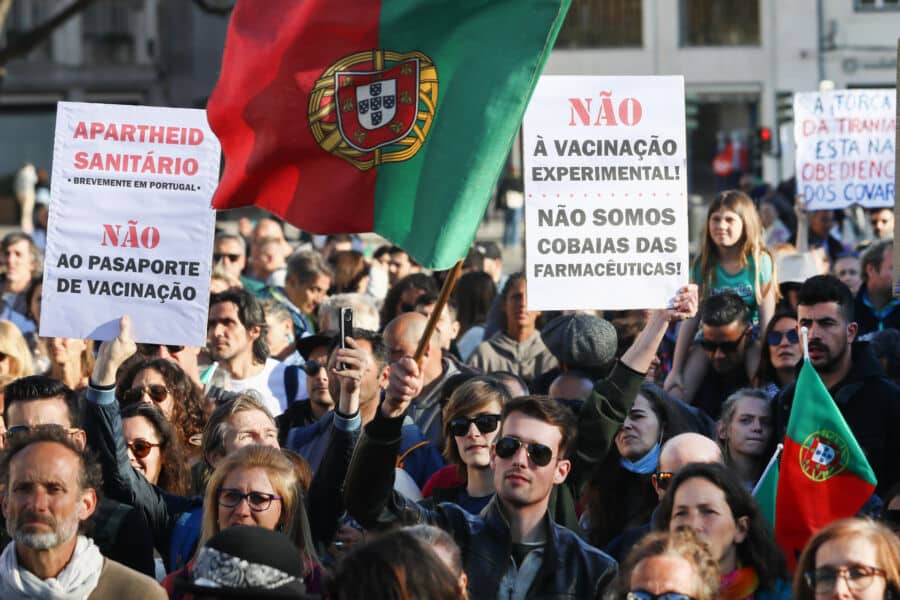Portugal’s up and coming political force ‘routs’ former parliamentary speaker
CHEGA’s extraordinary success in the March 10 elections perpetuated yesterday with an unprecedented win in the ‘emigré circles’ (the party won 2 MPs, as opposed to AD and PS Socialists’ one a piece).
Party leader André Ventura said before the final results came in that if CHEGA managed to ‘beat’ its former parliamentary ‘adversary’ – speaker of the House Augusto Santos Silva, a former PS minister and potential candidate for Portugal’s next president – it would be “the cherry on the cake” of these election victories – and this is exactly what happened.
Augusto Santos Silva, in the words of one political commentator yesterday, got ‘karma’ for all the occasions in the house over the last few years where he has continually remained a member of the Socialist party (and therefore ideologically against almost everything CHEGA stands for) instead of assuming the impartiality of the role of ‘president of the assembly of the Republic’.
Speaking last night on SIC Notícias, Santos Silva admitted the defeat was personal, not simply political.
André Ventura gave a speech as the results became clear saying it was “a particularly important victory, because it is a symbol of the victory of humility over arrogance, of democracy over political ideology”.
The latter observation is undeniable: more emigrés than ever before voted in these recent elections (well over 300,000, though many voting papers were ruled invalid), and a sizable number voted for CHEGA.
Indeed, the party emerged the second most voted party by emigrés, both inside and outside Euope (which considering it only ‘began’ in parliament in 2019 is nothing short of extraordinary).
Expresso has given a breakdown of how Portuguese nationals living abroad voted:
In France, PS Socialists won with 18.59% of the votes, pipping AD to the post (AD polling 16.75%). CHEGA polled 12.63%.
In the UK the result was similar: PS in front with 15.22%, a thousand votes above (12.42%) and a long way ahead of CHEGA (10.39%).
Germany too saw PS Socialists ahead of AD (by 400 votes, and with 20%); CHEGA managing 13%.
In Belgium, where only 5.381 Portuguese voted, the PS advantage over CHEGA was very tight: 31 votes; AD came in third place.
Spain, saw AD win, with 24.6% of the votes — CHEGA coming third, behind Socialists, with 9-38%.
CHEGA won however in Luxembourg, with 19.61% of the votes, ahead of first AD (14.27%) then PS (12.97%). More than 13,000 Portuguese voted.
CHEGA’s most decisive vote, explains Expresso, was in Switzerland where 49,000 Portuguese voted: the party won 32.62% of the votes (16,226); AD came second – but a long way behind with just 13.1%, and almost 10,000 votes LESS, “which is almost double the advantage that CHEGA managed over the PS in the European circle”, says Expresso.
In the remaining European countries AD won with 19.29% of the votes, PS came in second place (16.08%), CHEGA in third (11.6%) and Iniciativa Liberal (a potential ‘ally’ in the new government) with 9.10%.
Outside Europe:
AD won in the United States with 20.1% of the votes, followed by CHEGA (11.2%) and then PS (10.9%).
In Canada, AD also won with 19,6% , followed by the PS (14.4%) and then CHEGA (11.1%). The size of AD’s victory increased with the other countries in America, culminating in 34.4% of the votes, followed by PS (13.1%) and then CHEGA on only 6.2%.
The same goes for African countries where AD registered 31.1% of votes, PS getting only 23%/ CHEGA 18.5%.
In China, AD’s victory was even greater (37.4%), followed some way behind by PS (12.1%) and then CHEGA (5.3%).
Asia and Oceania also saw the same kind of results: AD first (31.5%), PS second (13.3%), CHEGA third (8%).
But in Brazil, CHEGA swept the board with 24.6% of votes. Brazil is a country divided, and has been since Lula da Silva celebrated his win over ‘Trump of the Tropics’ Jair Bolsonaro. Says Expresso, it was the win in Brazil that earnt CHEGA its ‘out of Europe MP’ as it extended the party’s lead over PS Socialists by more than 5,000 votes.
Augusto Santos Silva is now unable to pursue further political aspirations – at least for this legislature (and he is returning to teaching economics in Porto university).
The names of the final MPs voted in to Portugal’s fractured parliament are: Paulo Pisco (PS) José Dias Fernandes (CHEGA) for the European constituency; José Cesário (AD) Manuel Magno (CHEGA) for Out of Europe.
natasha.donn@portugalresident.com




















